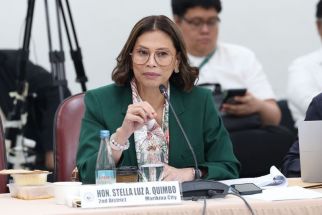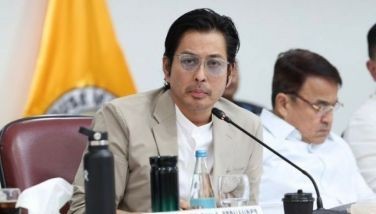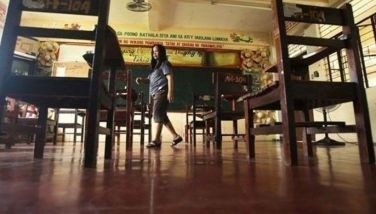The new faces at the Senate
July 5, 2004 | 12:00am
Madrigal and Revilla can be considered comeback kids, having lost in the 2001 elections but for different posts. Roxas, on the other hand is an accidental politician, but his topping the Senate race last May was hardly a surprise.
From the Commonwealth era up to the time of President Ramon Magsaysay, members of the family of Sen. Maria Ana Consuelo "Jamby" Abad Santos Madrigal had served in government.
Madrigal’s great grandfather was the late Chief Justice Jose Abad Santos, after whom a school is named. The chief justice, who hailed from San Fernando, Pampanga, refused to pledge allegiance to the Japanese Imperial Army during the second world war and was executed.
Her granduncle, Pedro Abad Santos, served as an assemblyman during the Commonwealth era and was the founder of the Socialist Party of the Philippines. The Abad Santos brothers were rich landowners who gave up their land to live with tenants in their fight for social justice.
Madrigal’s paternal grandfather was the late Sen. Vicente Madrigal of Ligao, Albay. Her aunt, Pacita Madrigal-Gonzales, was also elected senator during the administration of Ramon Magsaysay.
Pacita was the first administrator of the Social Welfare Administration, an agency that later became the Department of Social Welfare and Development (DSWD).
Jamby herself has a degree in economics and was educated in England and the United States. She has been managing the family’s huge interests in shipping and real estate. She is fluent in European languages, including Spanish, French, German and Portuguese. In fact, her love for the French language led to a marriage to Frenchman Eric Jean Claude Dudoignon Valade.
Serving the government is nothing to new to her. In October 1999, former President Joseph Estrada appointed her adviser for children’s affairs, which gives children of indigent families access to the highest councils in government.
In her stint in this office, Jamby organized the First National Summit for Children at Malacañang on Oct. 26, 2000, where government agencies, local government units, industry leaders and non-government organizations signed a declaration of commitment upholding Child 21, a framework on which action plans and strategies relating to children will be anchored.
The declaration was the first in Southeast Asia and a sequel to the United Nation’s world declaration on the survival, protection and development of children, which was adopted during the World Summit for Children on Sept. 30, 1990.
While championing children’s rights, Jamby, an also-ran in the 2001 senatorial elections, has set up several foundations to help alleviate the problem of widespread poverty. These foundations include the Books for the Barangay Foundation Inc., the lead partner of the US-based Books for the Barrios Organization, which has shipped more than P2.5 billion worth of books for public elementary and high schools. Another foundation was the Abad Santos Madrigal Foundation Inc. which works to empower women and children through relevant and accessible livelihood programs. Its flagship project is the Basic Reflexology Training Program which has so far trained more than 5,000 reflexology therapists nationwide.
Like his father, Revilla’s entry in politics was preceded by years in the movie industry as an action star. He is married to actress Lani Mercado, with whom he has six children.
Revilla’s elementary education was at the Jesus Good Shepherd in Imus, Cavite where he graduated in 1977. He graduated in 1982 at the Fairfax High School in Los Angeles, California. He also obtained a training on local government administration at the Development Academy of the Philippines in 1998.
Revilla ran in the 1995 elections and won as vice governor of Cavite. During this time, he also chaired Cavite’s Provincial Task Force Against Illegal Gambling dubbed "Task Force Sugal na Bawal" and founded the Ramon "Bong" Revilla Jr. Foundation Inc. and the RRJ People’s Organization Inc., where he served as chairman and president and chairman, respectively.
Finishing his term as Cavite’s vice governor, Revilla ran for governor and won in the 1998 elections. His godfather, then vice president Joseph Estrada, also won as the 13th president of the country.
As governor of Cavite from 1998 to 2001, Revilla also chaired various civic organizations such as the Cavite Clean and Green project, Region IV Peace and Order Council, Calabarzon Development Council, Cavite Provincial Peace and Order Council, Provincial Development Council and the Cavite Provincial Tourism Council. He also founded the Cavite Rescue 161, an emergency response unit of Cavite.
On Jan. 20, 2001, Revilla’s political career nosedived when Estrada was impeached and was forced to leave Malacañang on charges of massive graft and corruption. At the height of the second people’s uprising in EDSA, Revilla appeared at EDSA Shrine to express his support to the anti-Estrada forces and called for his godfather’s resignation. In the 2001 local elections, Revilla lost his re-election bid as Cavite governor to Ayong Maliksi.
Political analysts attributed Revilla’s defeat to his defection to the Arroyo administration. However, President Arroyo appointed Revilla as chairman of the Videogram Regulatory Board (VRB) in July 2002, a post he held until he decided to run for senator in the elections last May 10.
In his stint as VRB chairman, Revilla launched a massive campaign against the rampant smuggling and selling of fake VCDs all over the country.
In a telephone interview, Robert Moraleda, Revilla’s campaign officer, told The STAR that Revilla’s decision to return to politics was just an "answer to the calling for public service."
"It was a calling. He (Revilla) answered the calling for public service. It’s a way of giving back to the people," Moraleda said.
Revilla was a recipient of many awards both in public service and in the movies, including, among others, a medal of valor and an international award of honor from the International Narcotics Enforcement Officers Association Inc. in Albany, New York given on Oct. 11, 1999. He also received a plaque of International recognition for his efforts against piracy from the Motion Picture Association of America, Motion Picture Association International, and the Huwarang Lingkod Bayan Award from the Consumers League of the Philippines Foundation Inc.
Revilla was named Most Outstanding Governor of the Department of Health (DOH) Sandugo National Program on July 31, 2000, the Most Outstanding Governor of Gawad Papuri Awards on March 23, 1999 and was given the Lifetime Achievement Award by the National Press Club (NPC) on Oct. 27, 1998.
But who would ever think that this clean and good-looking young bachelor, who, at first, did not seem to have any inclination in politics, would garner almost 19 million votes in the last elections?
Roxas, who earned the moniker "Mr. Palengke" from his frequent rounds of public markets as the secretary of trade and industry to check on prices of basic commodities, was an investment banker in New York before he won in the special election as representative in Capiz when his elder brother Gerardo "Dinggoy" Roxas Jr. died of cirrhosis of the liver.
Roxas obtained his elementary and high school education at the Ateneo de Manila University where he graduated in 1970 and 1974, respectively.
After finishing high school, he went to the United States to study Economics at the Wharton Business School of the University of Pennsylvania where he graduated in 1979.
In an interview with The STAR, Sen. Joker Arroyo said that the young Roxas’ entry in politics could be viewed as accidental.
In 1992, his elder brother Dinggoy was elected representative of the first district of Capiz. However, he died within the year and Mar succeeded him in a special election.
Arroyo said that Mar, though not a lawyer, has been a very effective majority leader in the House of Representatives. But in 2001, he was tapped by former President Joseph Estrada to serve as trade secretary.
He resigned in November 2000 at the height of the jueteng scandal that rocked the Estrada administration but President Arroyo picked him as her own trade secretary when she assumed the presidency the following year.
In a separate interview with The STAR, Batanes Rep. Florencio "Butch" Abad, president of the Liberal Party of which Roxas is a member, said the LP, including the people, are looking up to Roxas to become the country’s next president in 2010.
"Many people, not only the LP, are looking at him as a potential president for 2010. He represents the new breed of young politicians who (are) technically competent. He possesses a confluence of corporate skills, a pedigree as a politician, a political influence in the corporate community," he said.
Abad said he had witnessed how Roxas transformed himself from a young technocrat to an efficient politician, having served with him in Congress for two consecutive terms.
"The House experience gave him an understanding of what politics in the Philippines is. In DTI, he learned to govern. In the Senate, he will learn how to be a national policy maker. In a globalizing world, experience in politics and good corporate background is what we need to make our country globally competitive," Abad said.
In the Senate, Roxas said that he will push for the change of the form of government from presidential to a parliamentary system.
"I saw the slow pace and weaknesses of the present system of government. The one making the policy should also be the one tasked to implement such policy. To enable us to have pragmatism and consistency, the so-called redundancy of function must be eradicated. At present, we have about P300 billion unfunded policy," Roxas said.
He said that the check and balance in the presidential form of government was way too much that it causes a "gridlock" in the funding of programs approved by the House of Representatives.
"You are creating laws, but these are not being funded. This makes the people cynical about laws like the anti-money laundering law. Our people are frustrated, but by having one body, the government action will be concise. The system has to have inherent check and balance because if you are in the US, for example, we can no longer monitor your movement. A unicameral form becomes the mechanism that would essentially reform the government to make us more efficient," Roxas said.
In his stint as trade and industry secretary, Roxas introduced what he coined as the "Palengkenomics" which injected opportunities for enterprise development.
Roxas said that the marketplace is a major catalyst in the country’s growth since every Filipino — whether in rural or urban areas — finds the main pulse of commerce, culture and communication in the palengke (public market).
"I believe that the palengke is the foundation of our country’s economic future," Roxas said.
A firm believer of information technology, Roxas said that he distributed 30,000 personal computers to 2,000 public high schools and local government units nationwide through his Personal Computers for Public Schools or PCPS project during his stint as trade secretary.
Roxas also introduced the Gamot Pampamilya program which provides affordable, but high-quality medicine to government and DOH-certified hospitals.
He also introduced the Pinoy Pan de Sal, a bromate-free pan de sal standardized at 25 grams and priced at P1 each.
During his stint from 1993 to 1998 as representative of the first district of Capiz, Roxas’ legislative agenda focused on strengthening the country’s economic foundations and enhancing its competitiveness.
Foremost among Roxas’ legislative initiatives was Republic Act 7880, a landmark legislation aptly named as Roxas Law, which rationalizes the Department of Education, Culture and Sports’ capital outlay, particularly for the nationwide construction of school buildings, in recognition of the reality that fair and equitable access to education underpins sustainable development.
Roxas was a recipient of the 16th Lee Kuan Yew Fellow award which was given to him last year by the Singaporean government.
To Be Continued
BrandSpace Articles
<
>
- Latest
- Trending
Trending
Latest
Trending
Latest
Recommended




























